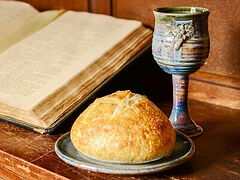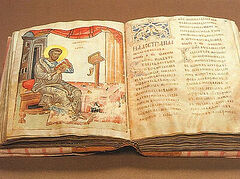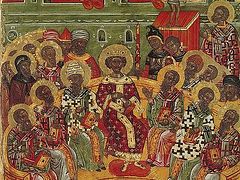We continue our talks on the Book of Acts with Sergei Komarov, a well-known catechist based in Moscow.
4:13 Now when they saw the boldness of Peter and John, and perceived that they were unlearned and ignorant men, they marveled.
Could you imagine what would happen if such a simple person were to get up and preach such a sermon today, where Old Testament prophecies are intertwined? It was quite a shock. They were surprised.
Now when they saw the boldness of Peter and John… The idea here is that the Jews hated this new religious freedom. It didn’t fit into the framework of the Jewish Law at all. And it was unpleasant for them. This is courage that comes from the experience of communion with God, when people truly testify to something. And the Jews were shocked by it, because they lived by rules. They’d been living only by rules for a long time.
4:13 … and they took knowledge of them, that they had been with Jesus.
4:14 And beholding the man which was healed standing with them, they could say nothing against it.
It’s interesting that the Sanhedrin reacts mildly here. It’s clear that they didn’t know what to do: Should they beat them, or not beat them; and what should they accuse them of? It’s bad that they were with Jesus; it’s bad that they’re against us, but what to accuse them of? The whole Sanhedrin is simply stuck in indecision. The Apostles set a precedent. Open persecution began later, but for now, they didn’t know what to do.
4:15 But when they had commanded them to go aside out of the council, they conferred among themselves,
4:16 Saying, What shall we do to these men? for that indeed a notable miracle hath been done by them is manifest to all them that dwell in Jerusalem; and we cannot deny it.
4:17 But that it spread no further among the people, let us straitly threaten them, that they speak henceforth to no man in this name.
What a naïve decision, of course, coming from impotence, from not knowing what to do next.
4:18 And they called them, and commanded them not to speak at all nor teach in the name of Jesus.
4:19 But Peter and John answered and said unto them, Whether it be right in the sight of God to hearken unto you more than unto God, judge ye.
Socrates said something similar, according to the testimony of Plato: “I will listen to God rather than to you.” He said this when he was accused before his death—so this somehow corresponds here.
4:20 For we cannot but speak the things which we have seen and heard.
4:21 So when they had further threatened them, they let them go, finding nothing how they might punish them, because of the people: for all men glorified God for that which was done.
4:22 For the man was above forty years old, on whom this miracle of healing was shewed.
That is, he was lame from birth, for forty years, and everyone saw him, and everyone knew him. And it’s very interesting how the first Church, the first Christian community prayed.
4:23 And being let go, they went to their own company, and reported all that the chief priests and elders had said unto them.
4:24 And when they heard that, they lifted up their voice to God with one accord, and said…
They began to pray. It’s an amazing reaction. They didn’t get angry. They weren’t afraid, although it was a threatening situation. That is, it was obvious that they were waiting to persecute the first Christian community. It was already obvious. They weren’t afraid. They prayed to God.
Now let’s read this first prayer of the Christian community. Earlier we talked about the four levels of interpretation of the Psalter. And here the Apostles use the Psalter in a Christian context.
4:24 And when they heard that, they lifted up their voice to God with one accord, and said, Lord, Thou art God, Which hast made Heaven, and earth, and the sea, and all that in them is:
4:25 Who by the mouth of Thy servant David hast said, Why did the heathen rage, and the people imagine vain things?
Can you guess the Psalm?
As for the address, this construction varies in many Psalms. In principle, it’s a classical prayer construction, and a kind of appeal to God, with some kind of name. In this case, Lord, Thou art God, Which hast made Heaven, and earth. In both Jewish and Christian prayer, we never simply say “God,” and then the request. For example: “Our Father, give me money.” We don’t say that. We say: “God,” then we add some theology about Who He is. For example, “Who art in Heaven,” or, “Who hast created Heaven and earth,” or perhaps, “Lord of Heaven and earth.” We add something like this—some theology and only then the request.
4:25 Who by the mouth of Thy servant David hast said by Thy Holy Spirit…
A testimony of the Divine inspiration of the Psalter, that it’s written by the Holy Spirit. Why did the heathen rage, and the people imagine vain things?
This is the second Psalm: Why do the heathen rage, and the people imagine a vain thing? The kings of the earth set themselves, and the rulers take counsel together, against the Lord, and against His anointed [Christ] (Ps. 2:1-2).
4:26 The kings of the earth stood up, and the rulers were gathered together against the Lord, and against His Christ.
4:27 For of a truth against Thy holy Child Jesus, Whom Thou hast anointed, both Herod, and Pontius Pilate, with the Gentiles, and the people of Israel, were gathered together.
We’ve said that the Psalter has at least four levels of interpretation. There’s the direct, literally historic meaning when, for example, David speaks about some of his enemies, as in this case. When David says, “His anointed,” who’s he talking about? About himself—he’s anointed; that is, David is a christ, because “christ” means “anointed.” David was anointed as king. In Biblical Hebrew, as in Ancient Greek, there are no capital and lowercase letters—they’re all capitalized. So the first level of interpretation of the Psalter is the historical—David has some enemies, and that’s who he’s talking about.
The second level is Messianic. It all has something to do with Christ; that is, in fact, the entire Psalter has a Messianic character. Either David’s words can be put into the mouth of Christ, or they concern some events from the life of Christ, or it’s the prayer of Christ. Here it’s talking about Christ, that the Gentiles gathered against Christ. In that context—against David; in this context—against the Lord Jesus Christ. This is the Messianic meaning.
As we’ve said, the third meaning is ecclesiastical or ecclesiological. What do the Apostles do? They peg this meaning to the life of the Church, to the problem of the Church at the moment. They say: “Truly, they have gathered in this city against Thy Holy Son Jesus” (cf. Acts 4:27).
And we understand from the context that it’s not against Jesus that the Gentiles have gathered, but against the Church, because Christ has already ascended. That is, persecution is no longer a problem for Christ, but for the Church, in a sense. Everything that concerns David concerns Christ and the Church too, because the Church is the Body of Christ, the fullness of the One Who fills all in all.
And the fourth meaning is personal. This is all that we can read in our personal prayers at home. We all have spiritual enemies. These are our passions, sins, it’s the demons, some destructive thoughts—these are our enemies. And we read it as if about ourselves. It’s about our thoughts, our desires. The kings of the earth stood up, and the rulers were gathered together (4:26). Everything fits spiritually. This is how Orthodox people read the Psalter. Of course, were there a Jew here, he’d be indignant and say: “You’re just taking it out of context and coming up with whatever you want.” But this is the interpretation of the Church, the understanding of the Church, and it’s always been that way. That’s why we always read the Psalter at the services. The Psalter is read once in its entirety every week, and twice a week in Great Lent, from Sunday evening to Friday evening.
In ancient times, no one could be consecrated a bishop if he didn’t know the Psalter by heart.
4:26 The kings of the earth stood up, and the rulers were gathered together against the Lord, and against His Christ.
4:27 For of a truth against Thy holy Child Jesus, Whom Thou hast anointed, both Herod, and Pontius Pilate, with the Gentiles, and the people of Israel, were gathered together.
4:28 For to do whatsoever Thy hand and Thy counsel determined before to be done.
This is an interesting phrase. We’ve already talked about the abundance of these intonations of predestination in the Apostle Peter. He constantly points out to the Jews that all events occur by the foreknowledge, the predestination of God. Here too “Thy hand” appears—an image of the power of God, an image of the activity of God. “Hand” in Greek here is “χειρ (cheir). Chiromancy, or palm reading, comes from this, by the way. Thy hand and Thy counsel. What does counsel mean? An expression of will, of thought. They talk about the “secret council of the Most Holy Trinity,” for example. Indeed, there is such a thing. We’ve heard: Let Us make man in our image, after our likeness (Gen. 1:26). Who says this to whom? It’s a mysterious point, in the first chapter of the book of Genesis. It’s the Persons of the Trinity taking counsel with one another. But this secret council of the Most Holy Trinity doesn’t mean, of course, counsel in our sense: “What are we going to do? Well, how about sending the Messiah there?” No, no, this is how Moses tells us the will of God. How else could it be transmitted to us? In fact, St. Andrei Rublev’s Holy Trinity Icon depicts this pre-eternal Council. St. Ignatius (Brianchaninov) says that long prayer before this icon purifies the mind.
4:28 For to do whatsoever Thy hand and Thy counsel determined before to be done.
4:29 And now, Lord, behold their threatenings.
See how the Church reacts to persecutions. It doesn’t say: “Lord, make them to disintegrate, yea, and even more,” as in the Old Testament. Let this be, and this. Here they react in a truly Christian way.
4:29 And now, Lord, behold their threatenings: and grant unto Thy servants, that with all boldness they may speak Thy word.
And that’s the whole request. That is, “Look, O Lord, and see their threats.” And for themselves, they ask to give the opportunity to preach, and that’s it. It’s clear that the Lord will respond. He will punish any wrongdoer, but the Lord keeps His finger on the pulse of the life of the world. This is the Church. This is essentially the prayer of the first Church.
4:29 And now, Lord, behold their threatenings: and grant unto Thy servants, that with all boldness they may speak Thy word,
4:30 By stretching forth Thine hand to heal; and that signs and wonders may be done by the name of Thy Holy Child Jesus.
There are several terms designating miracles in the Gospels: signs, wonders, and powers. Here again are signs and wonders. Healing is signs and wonders.
4:31 And when they had prayed, the place was shaken where they were assembled together.
This is, by the way, an Old Testament image, when something important happens. There often occurs an earthquake or some kind of natural disaster. In Revelation, many events will be accompanied by natural disasters.
… and they were all filled with the Holy Spirit, and they spake the word of God with boldness.
That is, God fulfilled this in prayer in response. He gave the grace to preach, and they all spoke with boldness, without fear. They were transformed. Just yesterday they were hiding behind closed doors for fear of the Jews. And now they aren’t afraid of anyone. And this was the preaching of the Apostle Peter. He knew perfectly well how it could end, but he speaks directly, fearing nothing. This is the fearlessness of someone who just yesterday was afraid of a servant girl. Indeed, he felt this contact with God. If that exists, then man fears nothing. If God is with us, who can be against us?
To be continued...







